| |  | | | Syrian Druze and Israel; Turkey vs. Israel over Syria; Pro-Hamas Profs By Winfield Myers ● Jul 23, 2025 Smart Brevity® count: 9 mins...2411 words After violent attacks against the Druze in Syria, some of them are ready to become part of the state of Israel. Aymenn Jawad Al-Tamimi offers an analysis of the situation and a translation of a commentary by a Syrian Druze sympathetic to Israel. Daniel Pipes writes that understanding the fighting in Syria between the central government in Damascus and its many foes requires seeing Israel and Turkey as the external combatants, with Syrians as proxies for these powerful neighbors. "What comes next for Syria," Pipes concludes, "will be determined largely by decisions made in Ankara and Jerusalem." In a pair of articles, A.J. Caschetta warns that the organization Faculty for Justice in Palestine is even worse than the better-known Students for Justice in Palestine. Professors, more powerful and permanent than students, are better situated to cause trouble—and more adept at getting away with it. An illustration of this is their ability, working with media allies, to whitewash the protests, depicting them not as violent, antisemitic events, but as heroic stances for oppressed Palestinians and free speech. We also feature articles by Nicoletta Kouroushi, Mardo Soghom, and Keren Karmiel. | | In Light of Violence Against Them, Some Syrian Druze Want to Join Israel 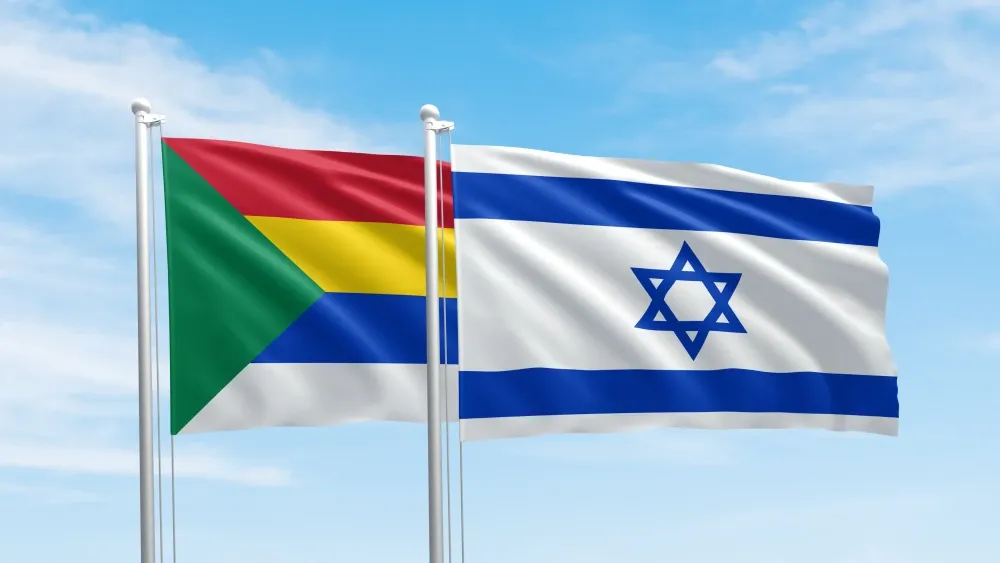 By: Aymenn Jawad Al-Tamimi In the wake of recent violence in the primarily Druze province of al-Suwayda', some Druze express increased sympathy for Israel, especially given its role in deterring government forces. Why it matters: Government forces and tribal militias committed significant violations against the Druze, prompting a reevaluation of alliances. -
It is clear that there is generally greater sympathy for Israel now among the Syrian Druze population, especially given the fact that Israeli military intervention was likely an important factor in preventing government forces from overwhelming the Druze factions. -
On the more extreme end among those who were already sympathetic to Israel, some now declare an open wish to join the Israeli state. -
Israeli Druze have protections that they do not get in Syria: whatever complaints they might have under the Israeli state, they do not live in fear of being attacked by mobs or armed groups of different sects. More insight: Ashraf Jamul of the "Joint Operations Room" voices a personal view favoring ties with Israel. Below is some of his statement: -
There are no longer solutions to be rid of the terrorist gangs that came by order of [Turkish President] Erdoğan and the leadership of [interim Syrian President] Jowlani and his gangs under various names and the participation of every filthy extremist on this land, except through joining the Israel state, which is the sole guarantee for being rid of this environment that is becoming more extremist and hostile day after day. -
You have to compare between the Druze's life and rights in Israel, and their life in the rest of the region's different states. You have to acknowledge who constitutes an existential threat to the Druze and who are the allied forces helping them. The stakes: If the Syrian government wants to prevent Druze in the country from increasingly identifying with Israel, then it needs to show that the community will be safe and not marginalized within the new Syria. To read the full commentary and translation, click here. | | The Momentous Turkish vs. Israeli Battle over Syria 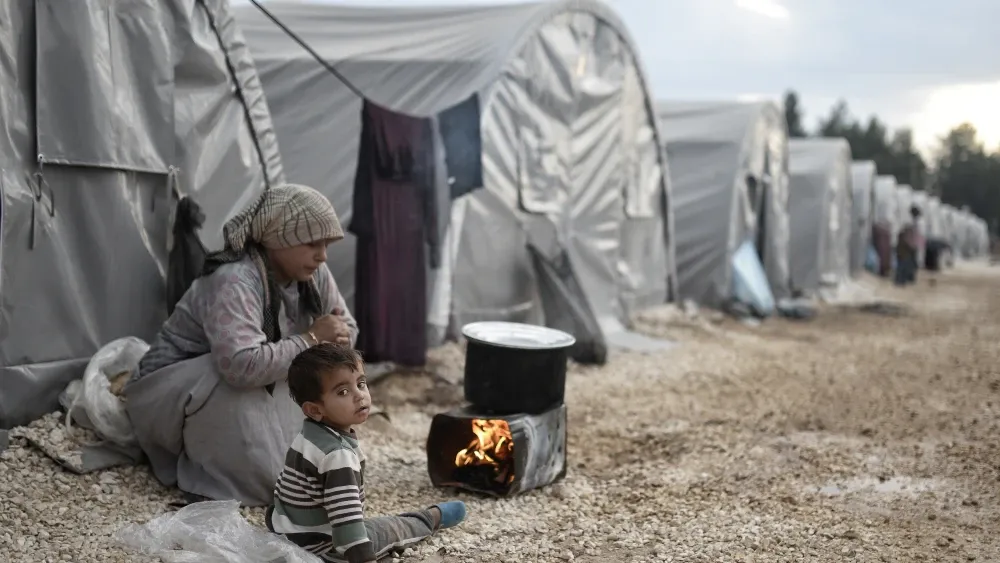 By: Daniel Pipes The conflict in Syria involves a complex interplay between the central government and its many foes, including Alawites, Kurds, Druze, and the Israel Defense Forces. Why it matters: The overthrow of former Syrian President Bashar al-Assad last December has shifted regional dynamics, reducing Iran's influence and leaving Turkey and Israel as primary external combatants. -
Turkey's concerns include managing Syrian refugees and preventing the fracturing of Syria into autonomous ethnic polities. -
Israel's interests lie in countering the Turkish goal of establishing a jihadist client state in Syria and protecting its Druze citizens and, by extension, the Druze of Syria. The stakes: Both Turkey and Israel face risks in Syria, including refugee influxes and geopolitical challenges. -
Turkey's use of the ruling Hayʼat Tahrir al-Sham faction in Syria aims to strengthen its position against Israel. -
Israel's strategic operations in Syria are influenced by its need to counter threats from Iran and placate its own Druze population. The bottom line: What appeared to be a Turkish opportunity in Syria a half-year ago now looks like an Israeli one, and what comes next for Syria will be determined largely by decisions made in Ankara and Jerusalem. To read the full article, click here. | | MEF Action Alert: Urge Congress to Protect Syrian Minorities from Sunni Islamists 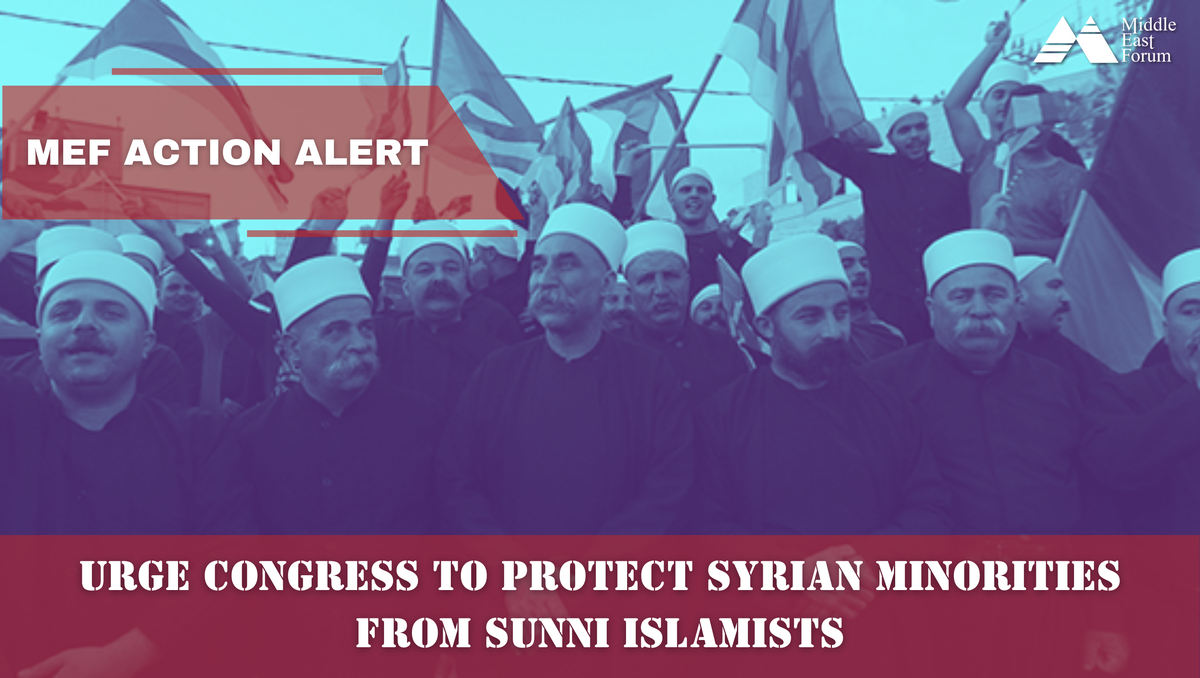 Syria's Alawite and Druze communities, along with Christians, Kurds, and other vulnerable minorities, face escalating atrocities under the Hayat Tahrir al-Sham (HTS)-led government. From July 14 to July 17, the Syrian Observatory for Human Rights has documented 516 deaths in Suweida, including 86 Druze murdered in "field executions" carried out by government forces or allied militias. Reports detail looting, burning of homes, and humiliation of Druze leaders, with videos showing government-affiliated fighters desecrating Druze symbols. In March 2025, Reuters reported over 1,500 Alawites killed in coastal cities by Syrian security forces and affiliated militias. These acts fuel fears of genocide against Syria's minorities, exacerbated by HTS's jihadist roots and failure to curb sectarian violence. Congress must act swiftly to address this crisis. Renewing sanctions against the HTS-led government would pressure it to halt abuses and protect minorities. Supporting Israel's targeted strikes to defend the Druze, as seen in Suweida and Damascus, is critical to deter further aggression. Opening a humanitarian corridor into Jordan would provide safe passage for displaced civilians, addressing the dire needs of 16.5 million Syrians requiring aid in 2025. Your voice can make a difference. By joining our campaign, you'll send letters to Congress urging immediate action to stop the killings, protect vulnerable communities, and ensure humanitarian relief. The Alawites, Druze, and other minorities deserve safety and justice. Without intervention, sectarian violence risks destabilizing Syria further, threatening millions. Click here to sign up now for our letter-writing campaign to demand Congress intervene on behalf of Syrian minorities! | | Turkey's Hold over Occupied Cyprus is Breaking. Don't Reinforce It 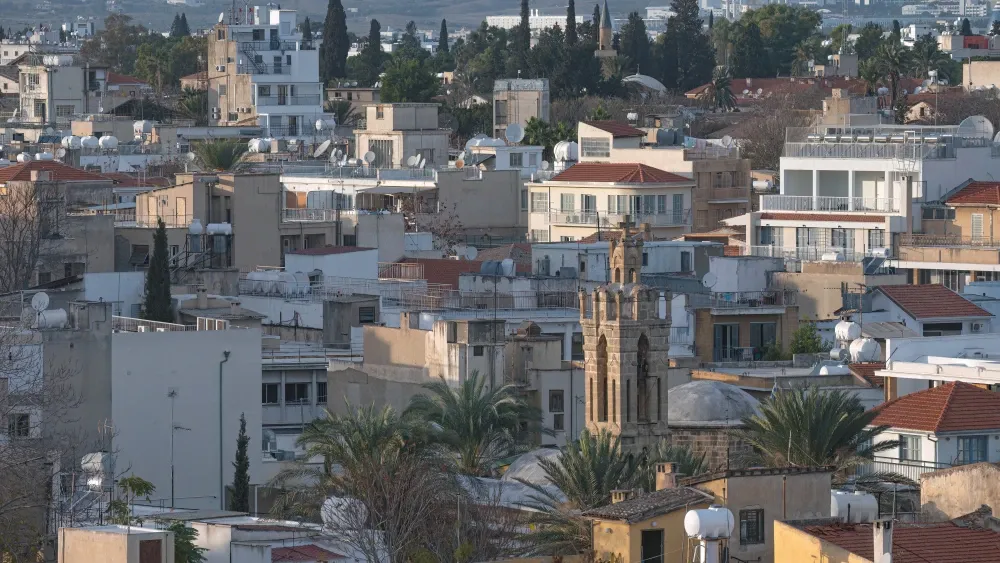 By: Nicoletta Kouroushi Turkish Cypriots are actively resisting Ankara's policies, taking their dissent from local protests to international legal channels. They have written a letter urging Cyprus's president to refer Turkey's actions in the north to international legal review. But the letter also did something else: It acknowledged the authority of the Republic of Cyprus. Why it matters: This movement challenges Turkey's claim to represent Turkish Cypriots and could alter the power dynamics in the region. -
Dissent against Ankara: Turkish Cypriots are protesting political interference, media pressure, and religious mandates, including mandatory headscarves in public schools, which they call an attempt to reshape their society along ideological lines. The stakes: Turkey justifies its illegal and unrecognized military occupation of northern Cyprus by claiming it acts on behalf of Turkish Cypriots, a claim now openly rejected by those the Turks say they're protecting. The bottom line: This is a pivotal moment where internal resistance in Cyprus aligns with broader U.S. interests. Recognizing this shift could constrain Turkey's influence without direct confrontation. -
U.S. opportunity: If the United States continues to treat the north as an extension of Turkish policy, it will miss an opportunity to reduce Ankara's leverage without direct confrontation. -
This is a rare moment when internal resistance aligns with broader U.S. strategic interests. It may not last. Ignoring it would serve no clear interest and would mean missing an opening that cannot be resurrected later. To read the full article, click here. | | Iran Shuts Down Capital amid Severe Water Crisis 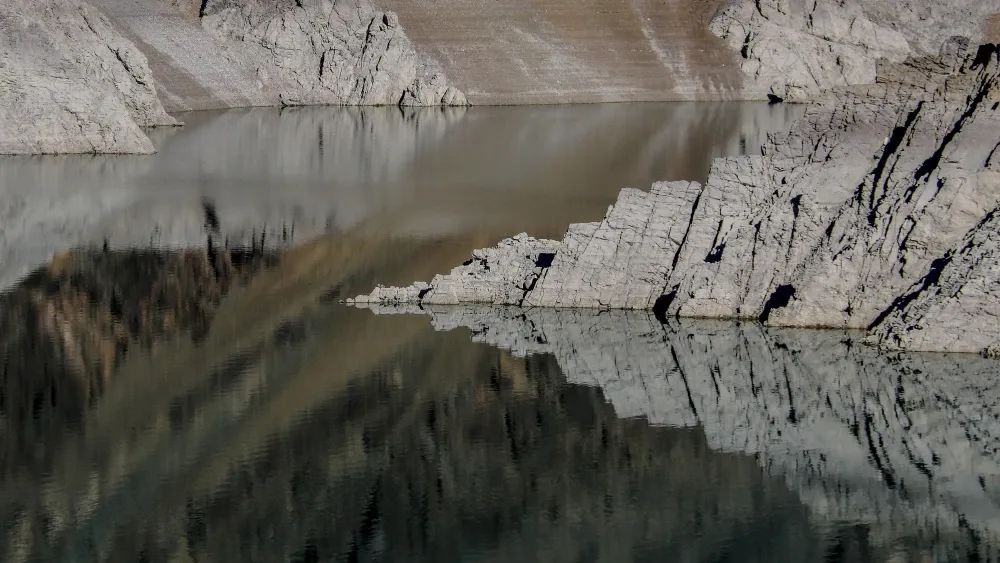 By: Mardo Soghom In recent days, the recurring theme in Iranian citizens' social media posts has been the word "outage": power outage, internet outage, and now, water outage. Their misery lays bare the government's chronic mismanagement. Why it matters: Poor water resource management is among the most critical underlying causes. -
While in Germany, 95 percent of household sewage is treated and reused in the agricultural and industrial sectors, in Iran, this figure is below 20 percent. -
Tehran residents, particularly in poorer districts like Nasimshahr, protest against prolonged water shortages. The stakes: The government's ineffective response, including a shutdown of Tehran on July 23, underscores its inability to address the root causes of the crisis. -
Unregulated dam construction has led to the drying up of 45 percent of Iran's wetlands, while every year, one million hectares of new desert are added to the country's already vast arid lands. -
Iran's consumption of 80 billion cubic meters of water annually for agriculture, which contributes only 11 percent to the economy, is due to the continued reliance on traditional irrigation methods. The bottom line: The regime's attempts to shift blame fail to convince both the public and the international community, as resource crises expose the depths of its negligence. To read the full article, click here. | | Announcing MEF's Internship Program Apply for the Middle East Forum's internship program to gain hands-on policy and research experience. Contribute to MEF's advocacy while building skills for a career in think tanks or government. -
Sessions: Fall (Sep–Dec), Winter (Jan–Apr), Summer (May–Aug) -
Commitment: 10 hrs/week, hybrid (on-site/remote) -
Eligibility: Undergrad/grad students in history, political science, Middle east studies, public policy, or related fields; strong research, writing, and analytical skills -
Program: Virtual orientation, project work, workshops, networking, and a capstone project -
Benefits: Professional development budget, D.C. policy conference tickets, MEF event access To apply: Send cover letter & resume to internship@meforum.org To learn more, click here. | | Faculty for Justice in Palestine Is Worse than Students for Justice in Palestine 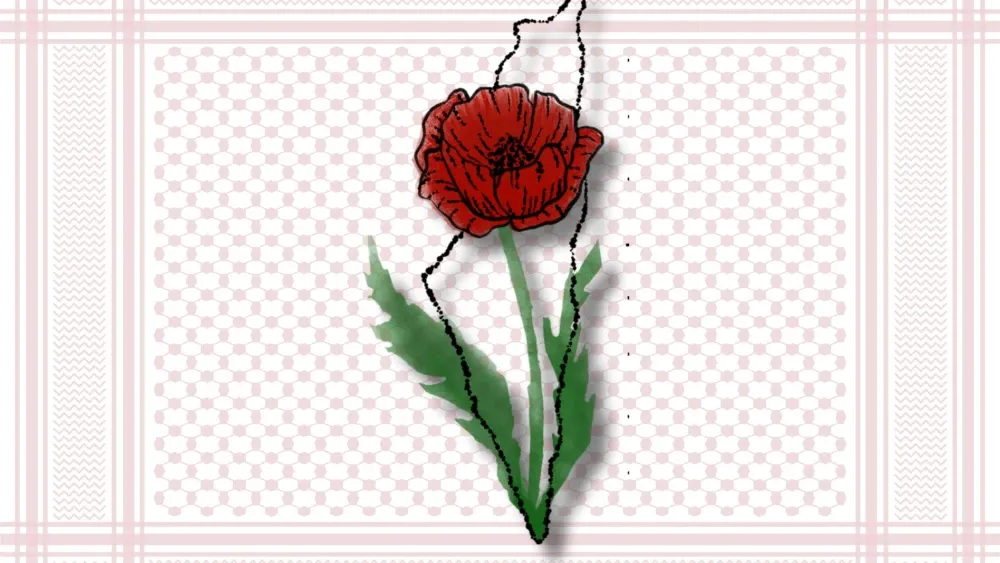 By: A.J. Caschetta The emergence of Faculty for Justice in Palestine (FJP) chapters post-October 2023 marks a disturbing escalation in university environments. Why it matters: These faculty-led groups are not merely academic entities; they are breeding grounds for antisemitism and anti-Israel sentiment, masquerading as scholarly freedom. -
They are even worse than Students for Justice in Palestine (SJP) because the professors who operate these quasi-official organizations with impunity will always foment new troubles, spawn new anti-Israel clubs, and wield antisemitism in the name of academic freedom. They will be even harder to bring under control than their students. Inside FJP: The surge of FJP chapters reveals a coordinated effort by faculty to legitimize anti-Israel rhetoric and actions. The stakes: Universities' failure to challenge FJP's toxic influence emboldens antisemitic behavior and jeopardizes academic integrity. The bottom line: Every school with a chapter affiliate of the National FSJP should denounce and investigate their faculty, staff, academics, educators, or librarians "for Justice in Palestine." Tenure or not, no one has a right to be "PART of this movement," and anyone who is should not be able to hide behind the veil of academic freedom. To read the full article, click here. | | Whitewashing Anti-Israel Campus Protests 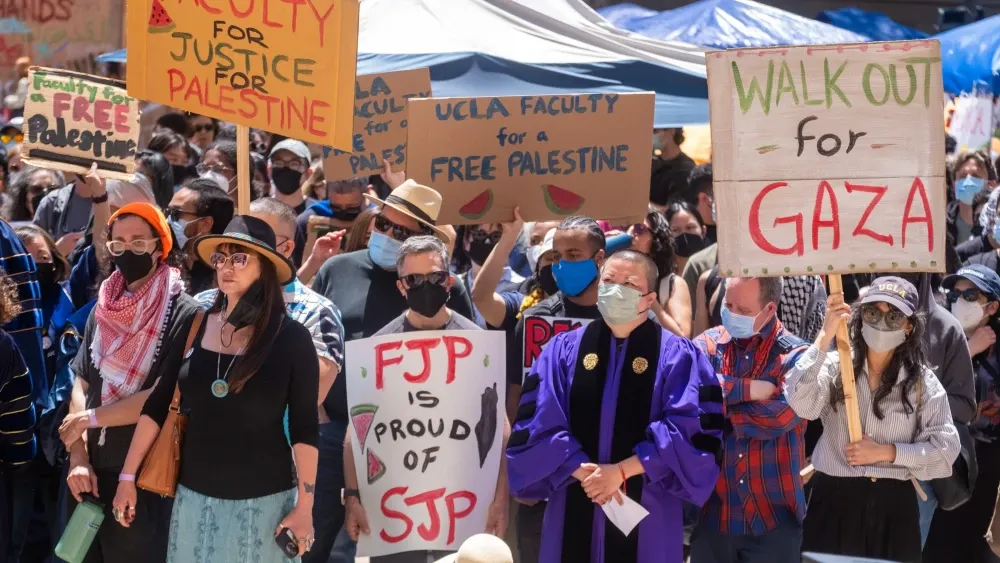 By: A.J. Caschetta Post-October 7 anti-Israel protests on American campuses reveal a disturbing trend where bigotry and disruption masquerade as advocacy. Why it matters: These demonstrations, led by Students for Justice in Palestine (SJP) and supported by Faculty for Justice in Palestine (FJP), are not just about free speech; they represent a forceful imposition of anti-Israel sentiment that disrupts education and fosters antisemitism. Inside the narrative: While insiders like Danielle K. Brown, a journalism professor at Michigan State University, praise the protests for their "moral courage," the reality is starkly different, with reports of violence, property destruction, and harassment of Jewish students. The bottom line: What will the Fall 2025 semester bring? Will there be more protests and encampments in solidarity with Hamas? Or maybe the Islamic Republic of Iran will be the new cause. -
Whatever comes, there will be no shortage of "insiders" to explain why you should not believe your lying eyes. -
The challenge lies in confronting the pretense of moral superiority and recognizing the protests for what they are—violent and divisive spectacles. To read the full article, click here. | | How Qatar Has Co-opted the University of South Carolina 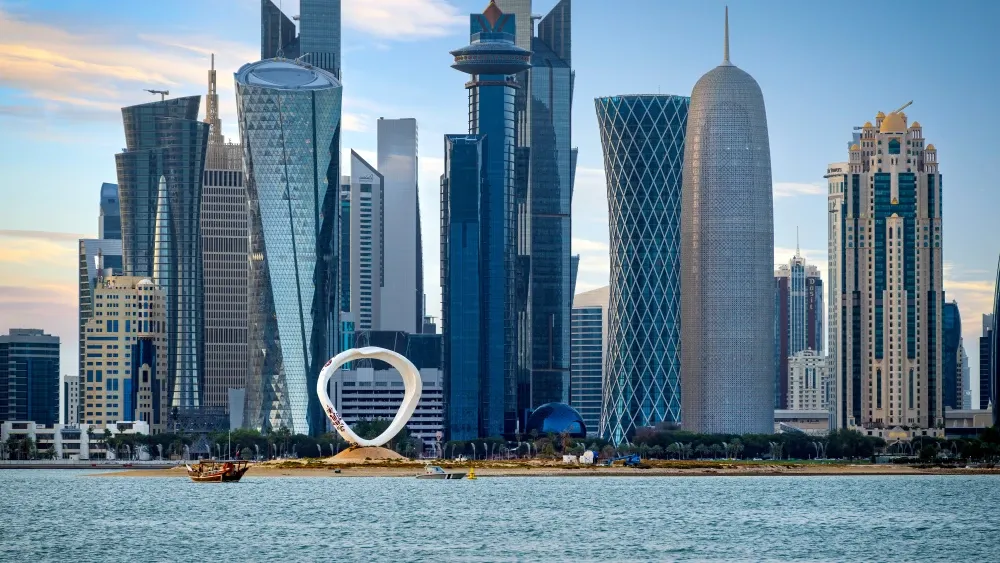 By: Keren Karmiel The University of South Carolina's (USC) Middle Eastern studies program is under fire for prioritizing Qatari interests over academic integrity. Why it matters: Qatar's financial influence has skewed USC's curriculum to present the region through an explicitly Islamic lens, sidelining the diverse religious and cultural heritage of the region. Exposing the influence: Over $17.5 million from Middle Eastern sources, including Qatar and Saudi Arabia, compromises USC's academic freedom, raising ethical concerns. -
There are also connections between Shaikha Abdulla Al-Misnad, mother of the Emir of Qatar, and William Hubbard, dean of USC's law school. Al-Misnad sits on the board of Hubbard's nonprofit, which frequently collaborates with Joel Samuels, dean of the College of Arts and Sciences. -
Thad H. Westbrook, who has chaired USC's board of trustees since 2012, is an equity partner at Nelson Mullins Riley & Scarborough, a Columbia, South Carolina-based firm. The bottom line: Qatar has publicly announced plans to invest billions of dollars in South Carolina and lobbies both state and federal actors, raising concerns about whether ideological, political, or financial interests influence how universities design curricula and hire faculty. To read the full article, click here. | | Given all the news from the Middle East plus myriad threats from that region, we are grateful that you turn to the Middle East Forum for insightful analysis. Please pass along this issue of the Dispatch, and let us know your thoughts on it via the comments feature. Sincerely, Winfield Myers
Managing Editor, Middle East Forum
Director, Campus Watch | | | | Was this edition useful?  

Your email will be recorded and shared with the sender |        MEF, an activist think tank, deals with the Middle East, Islamism, U.S. foreign policy, and related topics, urging bold measures to protect Americans and their allies. Pursuing its goals via intellectual and operational means, the Forum recurrently has policy ideas adopted by the U.S. government.
Copyright © 2024 Middle East Forum, All rights reserved.
Our mailing address is:
Middle East Forum
1650 Market Street, Suite 3600
Philadelphia, PA 19103 | | | | | Powered by 
| | This email was sent by Middle East Forum via Axios HQ | | | |
0 коммент.:
Отправить комментарий